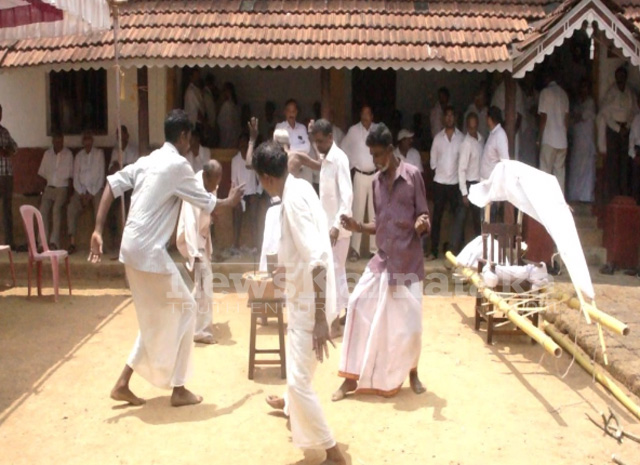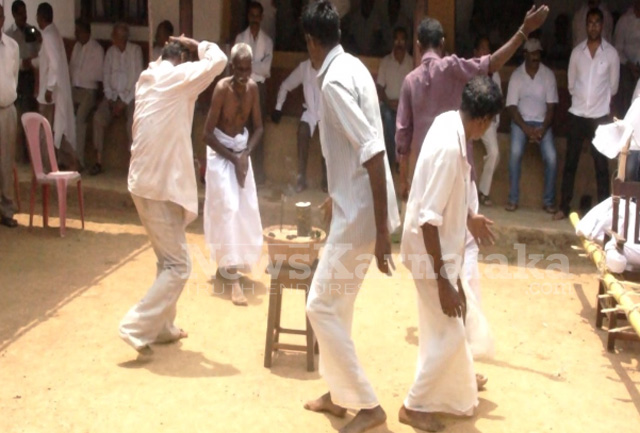Madikeri:
Angakali is the traditional tribal folk dance performed at the Kodava funerals before performing the last rites after the demise of the head of the family or elderly member by a special tribe called “Kembatti.” With changing times and attitudes most Kodavas of the present times are not even aware of this dance form called Angakali.
When Okkada (family head) dies in the Kodava family, Kembatti tribals in the village are summoned to perform Angakali.
A lamp lit using castor oil is placed at the centre of a cane basket filled with rice. Another tubular container and coconut is placed in the middle and a wooden rod is inserted in the rice. A white “Mundu” (Long piece of cloth tied around the waist extending till the ground) is given to the main performer by the family of the deceased.
The performer enacts a scene where he touches the dead body thrice by chanting, “Kattiri adanne bolla, kattiru abbayo” and circles around the lit lamp placed in the centre to the beats of “Malepoyithodeyutha” band.
The main Angakali performer has to strictly adhere to certain norms till the end of the funeral (Mengathe). If the deceased member is elder to him, he will be sent back home with a basket full of rice, coconuts, salt, meat, oil and cloth sufficient enough to stitch a shirt.
If the performer is woman, the cloth given will be of sari length.
The folk dance ritual is rarely seen off late at Kodava funerals with only a handful of artistes remaining, including Biddanda Kutada Sannu and Bollu to perform Angakali.
There is story woven around this folk funeral ritual by the Kembatti tribes. According to them, Lord Shiva had granted a boon to Basmasura using which the latter could turn anyone to ashes by placing his hand on the target. In an attempt to test his powers, Basmasura attempted to place his hand on Lord Shiva himself. Lord Krishna sensing the danger to Shiva, came to his aid in woman’s attire ultimately averting the danger.
Most Kembatti tribes believe this story led to the folk dance ritual at the funerals and continued it for generations.
Angakali is performed when deaths occur in Kodavas, Medaru and Kembatti communities.
The Kembatti tribals have performed the folk rituals at the cultural events/folk shows held in the cities of Bengaluru and Mysuru to keep the tradition alive and to draw the attention of the government for support.
Bavali residents near Parane, inhabited by Kembatti tribes rue over total neglect by all the concerned.
Angakali (word found in Malayalam language too) means “part dance” with “part” referring to the parts of the body and “kali” means play/dance. It is considered the last attempt by the Kembatti tribes to please the deity to rescue the dead (In this case Okkada-head of the family/eldest member).
source: http://www.newskarnataka.com / News Karnataka / Home> Special / by Coovercolly Indresh / January 03rd, 2017



